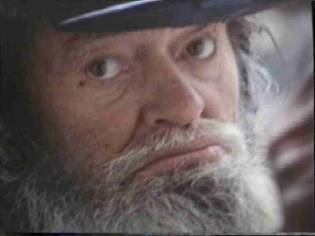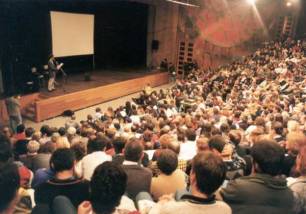CACHÍLO 
the poet of the walls
(por versión en Español, cliquee aquí)
Director:
Mario Piazza
Editing: Ernesto Figge
With the testimonies of:
Artists Osvaldo Boglione (to whose memory the video is devoted) and Gregorio Zeballos, actors Norberto Campos and Miguel Franchi, draftsmen David Leiva and Manuel Aranda, historians José Mario Bonacci and Héctor Nicolás Zinni, marchand and publisher Gilberto Krass, musician and writer Adrián Abonizio, critics and investigators Daniel Briguet and Roberto Retamoso, journalists and poets Gary Vila Ortiz and Reynaldo Sietecase, writers Armando Del Fabro and Carlos Mac Allister, journalists Ubaldo "Pato" Mauro and Manolo Rivadera , newspaper vendor Armando Carra, gastronomic trader Tito Del Fiori, cars keeper Joaquín "Charly" Orieta, butcher Sinforoso González, bookseller María Elena Daniello, and former mail workers Alberto Barbieri, Oscar Cuesta and Miguel De Benedictis.
Incluiding photos by: Alejandro Lamas, Norberto Puzzolo, Liliana Ponzanesi, Armando Del Fabro, Julio Sylvester, Fabián Drogo, Gustavo Bollea, Walter Magadan and Miguel Ariel
and video recordings by: José Luis Seguí and José Mario Bonacci
Drawings and paintings: Gregorio Zeballos, El Tomi, Manuel Aranda, Luis Lleonart, Alejandro O’Keeffee, Eduardo Risso, Miguel Depetris, Javier Armentano and Puré.
Music:
"Oda para Cachilo", composed by Bonacci and Torres, performed by Omar Torres and his quintet.
"Escritor de paredes", composed by El Tomi and De Benedictis, performed by Héctor "Pichi" De Benedictis
"Réquiem", composed by Nono Belvis, performed by El Umbral
"Trola Coca Cola", composed and performed by Gonzalo Aloras, after texts by Cachilo
Animations by: Esteban Tolj and BK & Basta, for El Sótano Cartoons.
Running time: 60 minutes

Premiered in Rosario on May 28 th,1999, at Centro Cultural Parque de España.
Synopsis
For about twelve years Cachilo inhabited the streets of Rosario city, in Argentina, devoted to inscribing the art of his unique poetry on the walls of the city. For many Rosarineans Cachilo became an emblem of dignity and freedom.
This documentary recovers the traces Cachilo left on the walls and in the memory of Rosarineans.
This is the first video work by filmmaker Mario Piazza, after 20 years of many Super 8 and one 16mm documentary film (Miss Olga's School, 1991).
This independent production was developed over more than four years. It was recorded with a little Hi 8 3 CCD camera and edited non-linearly with Premiere program over more than 300 hs.
Prizes
* UTPBA Prize of the Union of Press Workers of
Buenos Aires, 1999
* Best Human Document, Documentary Festival of Avellaneda,
BA, 1999
* Best Documentary, Video Week of Salta, 2000
Other Selections
* Jornada de Cinema da Bahia, Brazil, 1999
* Festival Cinematográfico Internacional del Uruguay, 2000
* Latin American Film Fest. of Montreal (Ciné-Fiesta),
Canada, 2000
* Festival Internacional de Cine de Valdivia, Chile, set/oct
2000.
* Astra Film Festival, Sibiu, Romania, oct. 2000.
* Global Visions Festival, Edmonton, Canada, nov. 2000.